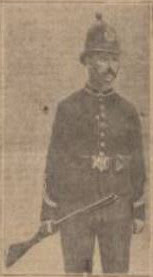Featured
- Get link
- X
- Other Apps
Dorset Standing Joint Committee Decisions
I have posted about the meetings of the Dorset Standing Joint Committees as reported in the local Newspapers before, 1930-35 here. The reports of the committee meetings enables us to get a insight into the Dorset police force, as they are responsibilities for the police budgets. Using newspaper reports gives us an impression but can be incorrect or give the view of the reporter and therefore need to be read with care.
I have chosen items that help to build a picture of the life of the policemen in Bridport Division between 1925 and 1929. I think Grandad Beck would have been typical of his generation and agree that Dorset did not require policewomen but welcomed an extra police constable and better equipment for his men. He would have “run a very tight ship” and any officer found socialising in the local pubs would have had, at the very least, a stiff talking too.
 |
| Supt. Beck was known for giving “a right earful” if an officer or family member didn’t live up to expectations |
More Policemen but no Policewomen
In October 1929 the committee discussed the need for extra Policemen. Major Peel Yates, the Chief Constable said he had had many of the Councils in Dorset had asked for an increase in police. This included Studland and West Bay, were there was an increase in summer traffic. In May the following year it was reported that the Home Secretary had agreed to eight extra constables, including one at West Bay.
The first Dorset Policewomen was appointed in 1937 but the Standing Joint Committee discussed women police officers over many years. 1925 was no different, the one of the Western Gazettes headlines in January was Police women again considered . The Home Secretary had recommended that every police authority provide Policewomen to take the statements of women and children, where sexual crimes were involved. In May 1925 the headline was Vexed Question of Women Police. A report was considered that had been prepared by a sub-committee. They [the Police Standing Joint Committee] considered that the report showed that there was not sufficient work in a rural county like Dorset to justify the employment of whole-time police women. They decided that it would be better for the Chief Constable to employ a female probation officer, welfare worker or other suitable woman to assist the police in such cases this he considered this was necessary. The appointment of a "women to assist with police enquires", for Bridport was reported in November of the same year. Mrs Lorna Heenan who had recently moved to Burton Bradstock was considered suitable by the Chief Constable. Mrs Heenan had been a policewoman at Cologne with the Army of Occupation, in World War One.
Torches and social functions
In February 1926 the committee recorded that it was contrary to the wishes of the Standing Joint Committee for any member of the Dorset Police Force to attend any social function connected with the licensed trade except in the execution of his duty as a police officer. Following a discussion this was not adopted but the Chief Constable reported in April 1926 he had the pleasure of stating now that officers of the force had since informed him that they will in future refrain from attending any such function… The way in which the information reached the Chief Constable was through the superintendents, who spoke both for themselves and the men under their charge. The committee seems pleased with the information as both Applause and calls of Hear, Hear was reported.
In May 1928 the Chief Constable reported that the constables in rural areas were still using oil lamps at night. These lamps were about 20 years old, worn out and leaked. This must have made night duty unpleasant for the 96 Dorset policemen stationed in rural villages. Villages would have been dark, very little light would have come onto the streets from the houses. The Chief Constable told the committee that Police Constables in most other forces had been supplied with pocket torches plus an allowance for batteries which ranged from 7 shillings 6 pence (about 37.5 pence in to-days currency) to 18 shillings (90 pence). The committee agreed to the purchase of 96 pocket torches providing the cost didn't exceed 2s 3d (11 pence). However, the committee granted the officers an allowance of 5 shillings for batteries. The officers must have needed to be very frugal with the use of their torches.
All original content by Sylvia Collins is copyright protected.
References Quotes in Italics:
Western Gazette: 1925 Jan 30; 1925 May 1 p10; 1925 Nov 6 p10; 1926 Feb 12 p 10; 1926 Apr 30 p10; 1929 Nov 1 p10; 1930 May 2 p10
Bridport News: 1928 May 4 p6
Hann, M. (2006) Bobbies on the beat, 1856-2006: 150 years of the Dorset police. United Kingdom: The Dovecote Press.
- Get link
- X
- Other Apps
Popular Posts
The Wilfully and Malice Murder of Winifred Mitchell
- Get link
- X
- Other Apps


Comments
Post a Comment